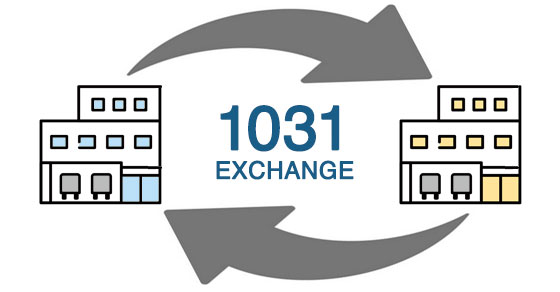A like kind exchange is a tax strategy in which the taxpayer is able to defer a tax gain of a commercial or investment real estate property by exchanging the property, rather than selling it.
This strategy is very beneficial and attractive with the current real estate market.

A like-kind exchange is any exchange of real property held for investment or for productive use in your trade or business (relinquished property) for like-kind investment, trade or business real property (replacement property). The relinquished property nor the replacement property can be real property held primarily for sale.
Important change
Under the Tax Cuts and Jobs Act, tax-deferred Section 1031 treatment is no longer allowed for exchanges of personal property — such as equipment and certain personal property building components — that are completed after December 31, 2017.
If you’re unsure if the property involved in your exchange is eligible for like-kind treatment, please contact us to discuss the matter.
Assuming the exchange qualifies, here’s how the tax rules work. If it’s a straight asset-for-asset exchange, you won’t have to recognize any gain from the exchange. You’ll take the same “basis” (your cost for tax purposes) in the replacement property that you had in the relinquished property. Even if you don’t have to recognize any gain on the exchange, you still must report it on Form 8824, “Like-Kind Exchanges.”
Frequently, however, the properties aren’t equal in value, so some cash or other property is tossed into the deal. This cash or other property is known as “boot.” If boot is involved, you’ll have to recognize your gain, but only up to the amount of boot you receive in the exchange. In these situations, the basis you get in the like-kind replacement property you receive is equal to the basis you had in the relinquished property you gave up reduced by the amount of boot you received but increased by the amount of any gain recognized.
An example to illustrate
Let’s say you exchange land (business property) with a basis of $100,000 for a building (business property) valued at $120,000 plus $15,000 in cash. Your realized gain on the exchange is $35,000: You received $135,000 in value for an asset with a basis of $100,000. However, since it’s a like-kind exchange, you only have to recognize $15,000 of your gain. That’s the amount of cash (boot) you received. Your basis in your new building (the replacement property) will be $100,000: your original basis in the relinquished property you gave up ($100,000) plus the $15,000 gain recognized, minus the $15,000 boot received.
Note that no matter how much boot is received, you’ll never recognize more than your actual (“realized”) gain on the exchange.
If the property you’re exchanging is subject to debt from which you’re being relieved, the amount of the debt is treated as boot. The theory is that if someone takes over your debt, it’s equivalent to the person giving you cash. Of course, if the replacement property is also subject to debt, then you’re only treated as receiving boot to the extent of your “net debt relief” (the amount by which the debt you become free of exceeds the debt you pick up).
Great tax-deferral vehicle
Like-kind exchanges can be a great tax-deferred way to dispose of investment, trade or business real property.
Do you want to sell commercial or investment real estate that has appreciated significantly? One way to defer a tax bill on the gain is with a Section 1031 “like-kind” exchange where you exchange the property rather than sell it. With real estate prices up in many markets (and higher resulting tax bills), the like-kind exchange strategy is attractive. A like-kind exchange is any exchange of real property held for investment or for productive use in your trade or business for like-kind investment, trade or business real property. Like-kind exchanges can be a great tax-deferred way to dispose of real property.
If you are considering implementing a like kind exchange as a tax strategy, please contact your Rudler, PSC advisor at 859-331-1717.
RUDLER, PSC CPAs and Business Advisors
This week's Rudler Review is presented by Maddie Schweitzer, Senior Accountant and Jane Frances, CPA.
If you would like to discuss your particular situation, contact Maddie or Jane at 859-331-1717.


As part of Rudler, PSC's commitment to true proactive client partnerships, we have encouraged our professionals to specialize in their areas of interest, providing clients with specialized knowledge and strategic relationships. Be sure to receive future Rudler Reviews for advice from our experts, sign up today !